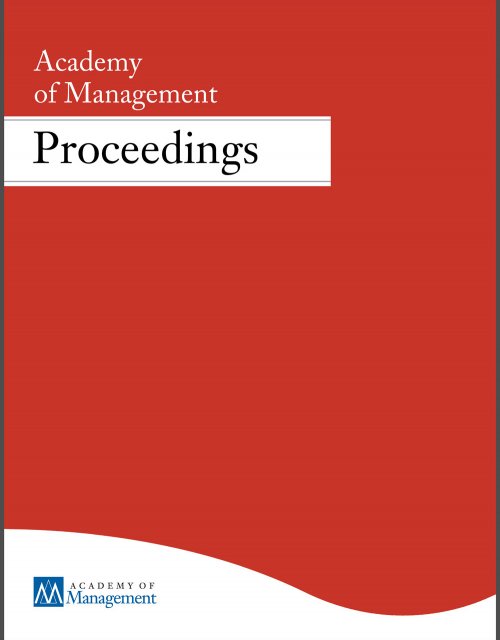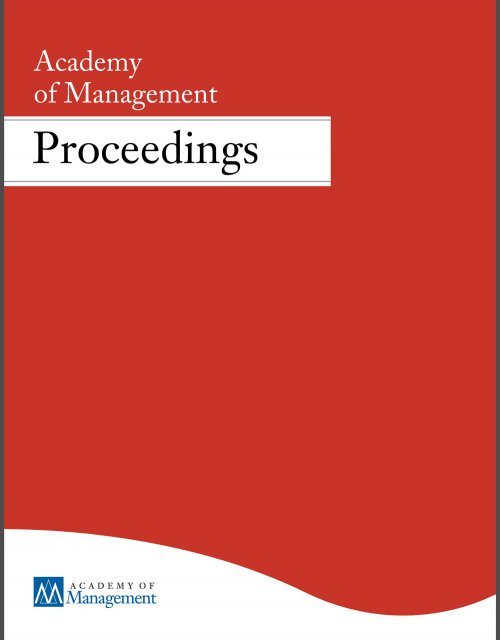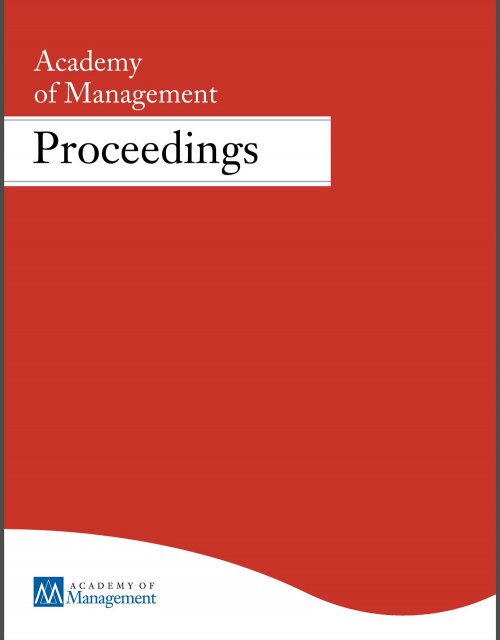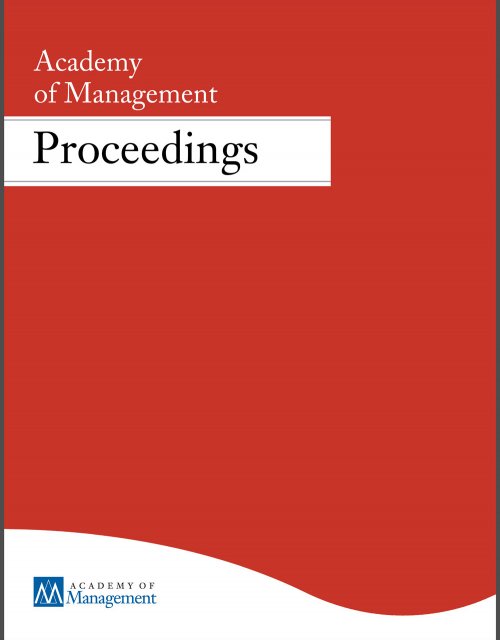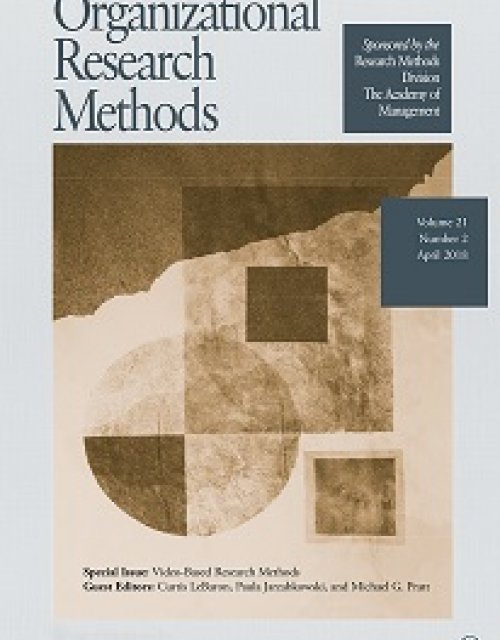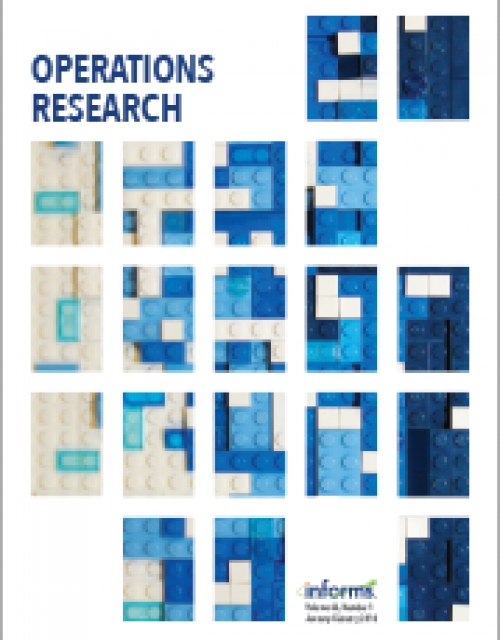Publication records
Subject(s)
Human resources management/organizational behavior
Keyword(s)
turnover contagion, social influence, resource loss, network dynamics, events model
Does turnover travel through social networks and, if so, how? Extant literature suggests that turnover can spread from one departing employee to another through a social influence process. While this assumes the existence of social relations, we lack understanding of whether and how different types of relations affect the contagion process. We build on the turnover literature, which conceives social relations as resources individuals lose when their contacts leave, to distinguish between different types of social relations (instrumental, expressive, energy) and resource providers (peers, supervisors) and examine how their loss relates to turnover contagion. We draw on a unique network dataset of 1,432 employees in the Chinese subsidiary of a Dutch multinational including employees’ date of voluntary departure (271 turnover events). We estimate models inspired from the Relational Event Framework to trace the spread of departures through social ties over time and account for the effect of each departure on the networks of remaining employees. Our results are consistent with considering turnover contagion as resource loss. However, they also suggest that contagion is triggered when losing access to specific resources from particular providers. We elaborate on our results to propose a theory of network turnover contagion.
With permission of the Academy of Management
Volume
2022
ISSN (Online)
2151-6561
ISSN (Print)
0065-0668
Subject(s)
Economics, politics and business environment; Strategy and general management; Technology, R&D management
Keyword(s)
Pharmaceuticals, patent, Markush
Markush structures are molecular skeletons containing not only specific atoms but al-so placeholders to represent broad sets of chemical (sub)structures. They allow a vast number of compounds (e.g., 10^16 different compounds within patent EP 0810 209) to be claimed in a patent application without having to specify every single chemical entity. While Markush structures raise important questions regarding the functioning of the patent system, innovation researchers have been surprisingly silent on the topic. This paper summarizes the ongoing policy debate about Markush structures and provides first empirical insights into how Markush structures are used in patent documents in the pharmaceutical industry and how they affect important outcomes in the patent prosecution process. While not causing frictions in the patent prosecution process, patent documents containing Markush structures have an increased likelihood to restrict the patentability of follow-on inventions and to hamper the entry of generic competition in the product market
With permission of the Academy of Management
Volume
2022
ISSN (Online)
2151-6561
ISSN (Print)
0065-0668
Subject(s)
Strategy and general management; Technology, R&D management
Social network research has made considerable progress in understanding how certain network structures emerge and the extent to which they affect outcomes such as innovation or organizational performance. In recent years, however, scholars have agreed that we also need to have a better understanding of the relational content that flows through network ties. In this symposium, we attempt to push network research forward by incorporating network content into our current understanding, especially how the content of network ties is narrated by social actors. This symposium aims to encourage fruitful discussion among organizational scholars on the extent to which studying the narrative of network tie content extends our knowledge of the impact of network structures.
With permission of the Academy of Management
Volume
2022
ISSN (Online)
2151-6561
ISSN (Print)
0065-0668
Subject(s)
Human resources management/organizational behavior; Strategy and general management; Technology, R&D management
Keyword(s)
interfirm mobility, brokerage, brokers, patents, innovative performance
Extant literature on social capital has demonstrated the positive effects of brokerage on employee productivity, particularly in knowledge-intensive and creative environments. Yet, little is known about the interactions between employee brokerage and employee mobility to competitors, another common theme in the strategic human capital literature. We posit that employees in brokerage positions face unique information and exposure and have different external opportunities than their peers in more constrained network positions. However, as brokerage is an inherently local network position, we further argue that the effect of mobility on employee productivity is substantially different for those in brokerage positions versus those in constrained networks. Moreover, the nature of these consequences is contingent on the breadth of expertise of employees. Using a large, longitudinal sample of inventors working for the world’s major pharmaceutical firms, we find partial support for the interactive effects of brokerage, mobility, and productivity. The findings of this study contribute to the social capital literature on employee brokerage and to strategic human capital research on inventor mobility.
With permission of the Academy of Management
Volume
2022
ISSN (Online)
2151-6561
ISSN (Print)
0065-0668
Subject(s)
Management sciences, decision sciences and quantitative methods
Keyword(s)
Brokering process, behavioral measure, relational events sequences, network algebra
Extant research in organizational networks has provided critical insights into understanding the benefits of occupying a brokerage position. More recently, researchers have moved beyond the brokerage position to consider the brokering processes (arbitration and collaboration) brokers engage in and their implications for performance. However, brokering processes are typically measured using scales that reflect individuals’ orientation toward engaging in a behavior, rather than the behavior itself. In this article, we propose a measure that captures the behavioral process of brokering. The measure indicates the extent to which actors engage in arbitration versus collaboration based on sequences of time stamped relational events, such as emails, message boards, and recordings of meetings. We demonstrate the validity of our measure as well as its predictive ability. By leveraging the temporal information inherent in sequences of relational events, our behavioral measure of brokering creates opportunities for researchers to explore the dynamics of brokerage and their impact on individuals, and also paves the way for a systematic examination of the temporal dynamics of networks.
With permission of SAGE Publishing
Volume
25
Journal Pages
459–489
Subject(s)
Human resources management/organizational behavior
Keyword(s)
Boundary spanning, supervisor undermining, territoriality, advice seeking
JEL Code(s)
M12
Volume
107
Journal Pages
1009–1019
Subject(s)
Management sciences, decision sciences and quantitative methods
Keyword(s)
Sequential decision making, time pressure, information search, Bayesian inference
Arrow et al. (1949) introduced the first sequential search problem, “where at each stage the options available are to stop and take a definite action or to continue sampling for more information." We study how time pressure in the form of task accumulation may affect this decision problem. To that end, we consider a search problem where the decision maker (DM) faces a stream of random decision tasks to be treated one at a time, and accumulate when not attended to. We formulate the problem of managing this form of pressure as a Partially Observable Markov Decision Process, and characterize the corresponding optimal policy. We find that the DM needs to alleviate this pressure very differently depending on how the search on the current task has unfolded thus far. As the search progresses, the DM is less and less willing to sustain high levels of workloads in the beginning and end of the search, but actually increases the maximum workload she is willing to handle in the middle of the process. The DM manages this workload by first making a priori decisions to release some accumulated tasks, and later by aborting the current search and deciding based on her updated belief. This novel search strategy critically depends on the DM's prior belief about the tasks, and stems, in part, from an effect related to the decision ambivalence. These findings are robust to various extensions of our basic set-up.
© 2019, INFORMS
Volume
70
Journal Pages
1293–1952
Subject(s)
Management sciences, decision sciences and quantitative methods; Technology, R&D management
Keyword(s)
decertification, innovation, quality management, standards
JEL Code(s)
L15, O32, L25.
The literature on quality-management standards has generally focused on the drivers, motivations, and performance effects of adopting such standards. Yet the last decade has witnessed a substantial degree of decertification behavior, as organizations have increasingly decided to voluntarily withdraw from quality-management standards by not recertifying. While the drivers of the decision to initially adopt quality-management standards have been extensively studied, the drivers of the decision to decertify have received scant scholarly attention. We argue that innovative organizations are generally prone to retaining quality-management certification and thus exhibit a tendency to not abandon certification; however, radically-innovative organizations are more prone than incrementally-innovative organizations to discontinue quality-management standards and thereby exhibit a tendency to withdraw from quality certification. We compile World Bank data surveying facilities based in 50 countries and 103 industrial sectors across the 2003 to 2017 period. Taking advantage of the data’s panel properties yields a dataset composed of up to 1,755 facility-level observations of recertification decisions for empirical analysis. Our empirical testing employs a probit estimation technique that accounts for the appropriate fixed effects and generates results that support our theoretical priors regarding decertification behavior.
View all ESMT Working Papers in the ESMT Working Paper Series here. ESMT Working Papers are also available via SSRN, RePEc, EconStor, and the German National Library (DNB).
Pages
54
ISSN (Print)
1866–3494
Subject(s)
Economics, politics and business environment; Management sciences, decision sciences and quantitative methods
Keyword(s)
subjective probability, choice under uncertainty, online experiments
JEL Code(s)
D01, D81, D84, C09
Anscombe & Aumann (1963) offer a definition of subjective probability in terms of comparisons with objective probabilities. That definition - which has provided the basis for much of the succeeding work on subjective probability - presumes that the subjective probability of an event is independent of the prize consequences of that event, a property we term Prize Independence. We design experiments to test Prize Independence and find that a large fraction of our subjects violate it; thus, they do not have subjective probabilities. These findings raise questions about the empirical relevance of much of the literature on subjective probability.
View all ESMT Working Papers in the ESMT Working Paper Series here. ESMT Working Papers are also available via SSRN, RePEc, EconStor, and the German National Library (DNB).
Pages
49
ISSN (Print)
1866–3494
Subject(s)
Management sciences, decision sciences and quantitative methods; Strategy and general management
Keyword(s)
deep learning, nlp, transformers, leadership, semantic networks, distributed representations
JEL Code(s)
C45, D7, D85
This dissertation proposes methods that bridge network science, machine-learning, and agent-based simulations to infer information about context-dependent relationships. The methods are applied to analyze and understand the roles and actions associated with organizational leadership. Findings indicate, among other things, that effective leadership, both as found in practice and in theory, may be more authoritative and hierarchical than is commonly asserted.
Journal Pages
156
